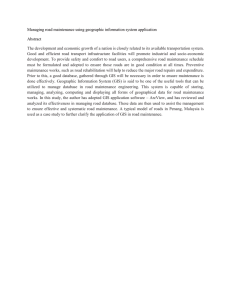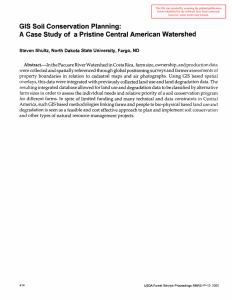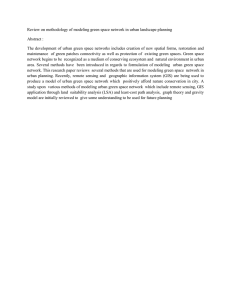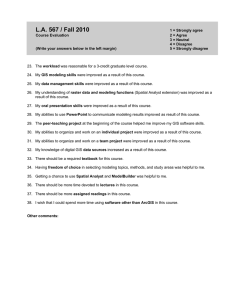Geography 210/Environmental Science 210 Maps, GIS, and the Environment Spring 2012
advertisement
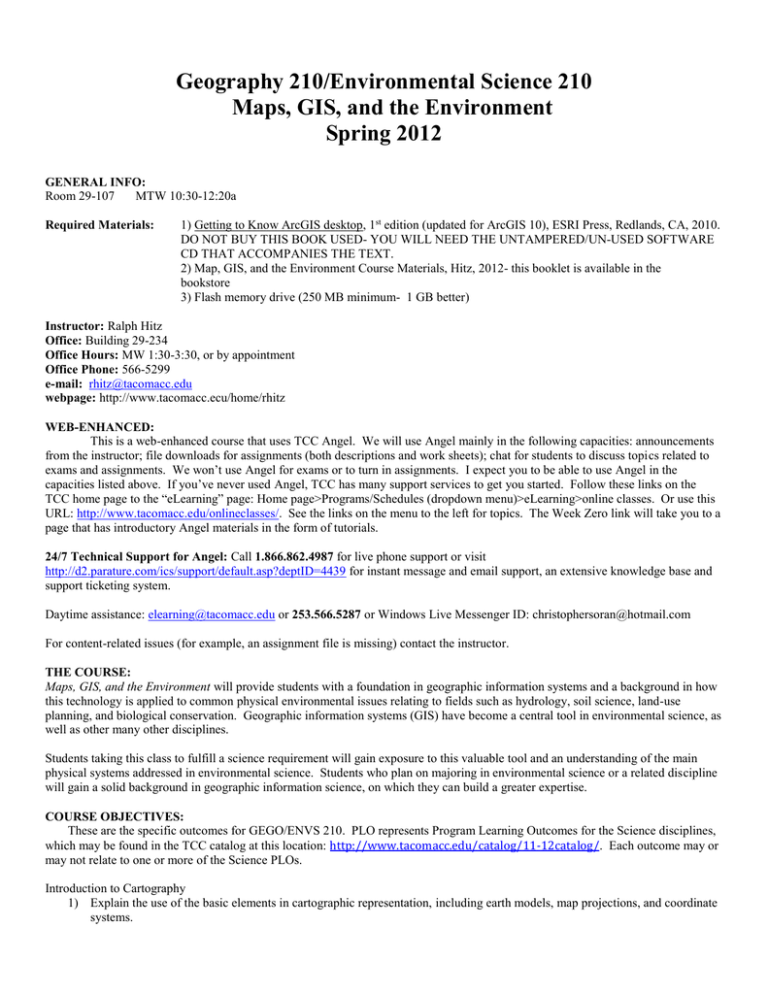
Geography 210/Environmental Science 210 Maps, GIS, and the Environment Spring 2012 GENERAL INFO: Room 29-107 MTW 10:30-12:20a Required Materials: 1) Getting to Know ArcGIS desktop, 1st edition (updated for ArcGIS 10), ESRI Press, Redlands, CA, 2010. DO NOT BUY THIS BOOK USED- YOU WILL NEED THE UNTAMPERED/UN-USED SOFTWARE CD THAT ACCOMPANIES THE TEXT. 2) Map, GIS, and the Environment Course Materials, Hitz, 2012- this booklet is available in the bookstore 3) Flash memory drive (250 MB minimum- 1 GB better) Instructor: Ralph Hitz Office: Building 29-234 Office Hours: MW 1:30-3:30, or by appointment Office Phone: 566-5299 e-mail: rhitz@tacomacc.edu webpage: http://www.tacomacc.ecu/home/rhitz WEB-ENHANCED: This is a web-enhanced course that uses TCC Angel. We will use Angel mainly in the following capacities: announcements from the instructor; file downloads for assignments (both descriptions and work sheets); chat for students to discuss topics related to exams and assignments. We won’t use Angel for exams or to turn in assignments. I expect you to be able to use Angel in the capacities listed above. If you’ve never used Angel, TCC has many support services to get you started. Follow these links on the TCC home page to the “eLearning” page: Home page>Programs/Schedules (dropdown menu)>eLearning>online classes. Or use this URL: http://www.tacomacc.edu/onlineclasses/. See the links on the menu to the left for topics. The Week Zero link will take you to a page that has introductory Angel materials in the form of tutorials. 24/7 Technical Support for Angel: Call 1.866.862.4987 for live phone support or visit http://d2.parature.com/ics/support/default.asp?deptID=4439 for instant message and email support, an extensive knowledge base and support ticketing system. Daytime assistance: elearning@tacomacc.edu or 253.566.5287 or Windows Live Messenger ID: christophersoran@hotmail.com For content-related issues (for example, an assignment file is missing) contact the instructor. THE COURSE: Maps, GIS, and the Environment will provide students with a foundation in geographic information systems and a background in how this technology is applied to common physical environmental issues relating to fields such as hydrology, soil science, land-use planning, and biological conservation. Geographic information systems (GIS) have become a central tool in environmental science, as well as other many other disciplines. Students taking this class to fulfill a science requirement will gain exposure to this valuable tool and an understanding of the main physical systems addressed in environmental science. Students who plan on majoring in environmental science or a related discipline will gain a solid background in geographic information science, on which they can build a greater expertise. COURSE OBJECTIVES: These are the specific outcomes for GEGO/ENVS 210. PLO represents Program Learning Outcomes for the Science disciplines, which may be found in the TCC catalog at this location: http://www.tacomacc.edu/catalog/11-12catalog/. Each outcome may or may not relate to one or more of the Science PLOs. Introduction to Cartography 1) Explain the use of the basic elements in cartographic representation, including earth models, map projections, and coordinate systems. 2) Use a map to locate features given coordinate pairs, and trace a route between two or more points on a map. (1) 3) Describe how features are symbolized in maps and interpret symbols on maps. (1, 4) Introduction to GIS 1) Summarize and explain the components (software, hardware, data, and user) of a geographic information system. 2) Differentiate between vector and raster data structures. 3) Demonstrate basic GIS software skills necessary for interacting with GIS data. These skills encompass file management, feature symbolization, feature and attribute editing, selecting features and records, and interpretation of metadata. (4) 4) Explain and execute common GIS analytical techniques such as map overlays and limited types of spatial analysis. (4) 5) Describe where to find publicly available GIS data. (1) Hydrology 1) Describe the elementary aspects of a hydrologic system including stream anatomy, channel structure, capacity and competence, and watershed. (3) 2) Describe how to determine stream discharge estimates, carry out field work to collect stream discharge data, and perform a procedure for calculating stream discharge estimates based on field data. (4, 5) 3) Demonstrate how to edit an existing digital map using GIS software in order to incorporate new hydrologic data. 4) Design a map layout using GIS software to communicate stream discharge data (or an alternate attribute) and compose metadata explaining the origin of the data. (4) Soil Science 1) Describe soil horizons and textural qualities of a soil and demonstrate an ability to identify these properties in the field. (3) 2) Explain the evolution of different soil types by way of the state factor equation. (3) 3) Recognize the value of soils to civilizations and the necessity of soil conservation. (1) 4) Carry out data collection on soil properties in the field, incorporate the data into a GIS analysis, and critique the strength of the analysis by reflecting on the quality of the field data, as well as the underlying assumptions of the analysis. (2, 4) Land Use Planning/Biogeography/Wetlands 1) Explain the legislative context for land use planning in Pierce County and how land use planning decisions are implemented. (1) 2) Explain the elementary aspects of biogeography including habitat, gradients, ranges, island biogeography. Illustrate how these concepts apply to conservation efforts. (3) 3) Identify the physical and biological conditions present at wetlands. (3) 4) Explain the value of wetlands form biological and hydrological perspectives. (1) 5) Use cadastral GIS data in conjunction with other data layers to consider land use planning scenarios. Identify and differentiate competing interests and concerns related to land use planning. Determine possible solutions involving competing interests, by using appropriate GIS skills and analytical techniques. Design hypothetical land use plans based on these evaluations. (4) GRADING: Grading will be based on the criteria below. The course grade will be determined by adding the percentages from each of the categories below. A simple, straight percentage scale will then be used to assign course grade: 100%-92.5% is an A, 92.5%-90% is an A-, 90-87.5 is a B+, 87.5-82.5 is a B, 82.5-80% is a B-, 80%-77.5% is a C+, 77.5%-72.5% is a C, 72.5%-70% is a C-, 70%-67.5% is a D+, 67.5%-62.5% is a D, 62.5%-60% is a D-, less than 60% is an E. Points assigned for each item below is subject to change during the quarter. Quizzes (4) Pop quizzes: ArcGIS skills Small projects and assignments (8) Major projects (3) 8.25% 2% 2% 15% each each each each 33% total 6% total 16% total 45% total 100% ASSIGNMENTS: Quizzes Quizzes (4) will test your understanding of the material we cover with respect to the six categories outlined in the Course Objectives: 1) Cartography; 2) Introduction to GIS; 3) Hydrology; 4) Soil Science; 5) Land-Use Planning; 6) Biogeography and Conservation. They will be mostly short answer format but some multiple choice and true/false questions also. Pop quizzes These will be short, practical tasks that timed but open source, that test your ArcGIS working knowledge. The tasks will relate to the tutorial assignments that should be completed by the date of each quiz. Small projects and assignments We will complete various small projects and assignments such as a map reading lab, producing projects in ArcGIS, and homework problem sets. These exercises will be made available by the instructor and posted on Angel. Major projects For the Hydrology, Soil Science, Land Use Planning sections we will complete a project that will integrate lecture information, field work, and GIS analysis. The purpose of these projects is for students to learn the process of applying GIS to specific environmental issues. You will work on projects in teams of two students with each participant receiving the same grade. The exact project descriptions and all related materials will be made available by the instructor. CLASS POLICIES: Attendance Attendance is critical. This course is “hands-on” and process oriented. There is not a ready source, such as a textbook, to fall back on should you miss classes. Much of the work also involves projects with a partner, which will require regular contributions from each group member. I will take regular attendance in lecture and lab. For each three classes that a student misses I will deduct 10% from their course grade. Students who have a perfect attendance record at the end of the quarter will receive 2.5% extra credit. Withdrawals and Incompletes May 25th is the last day to withdraw from the course with a grade of “W.” Under appropriate circumstances students may obtain an incomplete for the course. This option requires that the student fulfill the remaining requirements within a designated amount of time. Cheating Cheating on an assignment or exam will result in zero credit for that item and appropriate action as outlined in the TCC catalog. Plagiarism is likewise unacceptable. See the TCC Students Bill of Rights and Responsibilities for more information about cheating and plagiarism. Field trips Some of the labs will involve local field trips. Dress appropriately and wear sturdy shoes. The instructor will provide more information about the fieldtrips during the quarter. Late material/missed quizzes or exams Late materials are subject to 25% reduction in points per class day it is late, and there are no make-up quizzes or exams unless you contact me (phone, in person, or by email) before the original scheduled time of the quiz or exam. If you contact me after the quiz or exam has already taken place you are ineligible for a make-up. Accommodations for disabilities Accommodations for physical disabilities will be made insofar as they are possible. The lecture and a lot of project work will take place in a classroom setting and should present no difficulties. Both fieldtrip require walking over rough terrain. If you have a physical disability, please speak with the instructor at the outset of the course. Students with Special Needs All students are responsible for all requirements of the class, but the way they meet these requirements may vary. If you need specific auxiliary aids or services due to a disability, please contact the Access Services office in Building 7 (253-566-5328). They will require you to present formal, written documentation of your disability from an appropriate professional. When this step has been completed, arrangements will be made for you to receive reasonable auxiliary aids or services. The disability accommodation documentation prepared by Access Services must be given to me before the accommodation is needed so that appropriate arrangements can be made. Classroom disputes If you have questions or concerns about this class or me, please come to talk with me about your concerns. If we are unable to resolve the issue the next step would be to talk to the Science and Engineering Department Chair, Rebecca Sliger.. CLASSROOM BEHAVIOR General I expect basic courtesy: no conversations with neighbors during lectures, no leaving in the middle of lecture, and punctual arrival to class and fieldtrips. Electronic devices Cell phones will turned off or silenced in class and in the field while class is in session (unless arranged with me beforehand). No texting. Computers may be used for class work only. Exceptions may be made by the instructor as announced. If a student persists in rude behavior, counter to what I outlined in the two sections above, I will take appropriate measures, contacting administrative officials if necessary. For further expectations of student behavior on the fieldtrip specifically, please see the liability release form. CALENDAR: This calendar presents the basic schedule that we will follow. Tutorial assignments should be completed by the end of the week they are listed. Other reading assignments pertain to topics of that week in particular. Although I expect the timing and format to follow the calendar fairly closely there may be modifications of which I’ll promptly inform you. As we progress I will keep also keep you informed of the specific dates for quizzes and other assignments. Text: Getting to Know ArcGIS Desktop = GTKA. Week Lecture topics In-class activities Quizzes, Projects, Homework Reading 1 4/2-4/6 Introduction 1) Map reading exercise (Wed, 4/4, meet in 29-223 not 29-107), due in class 1) Quiz in lab, 4/2: basic computer skills GTKA Chps. 1, 2, 3, 4, 19 to the course Introduction 2 4/9-4/13 3 4/16-4/19 cartography Introduction to GIS a) GIS basics b) Data structures c) Common GIS analytical techniques Introduction to hydrology 2) Homework: complete Part I of Cartography Lab Exercise before we meet for the map reading exercise on 4/4 1) Exercise: starting ArcGIS projects (due in class) 1) Cartography quiz, 4/11 (review precedes quiz) Cartography ancillary reading- see course materials GTKA Chps. 5, 6, 7, 8, 10, 14c (pp. 384-390), 16 GIS ancillary reading- see course materials 2) Exercise: laying out maps in ArcGIS (due in class) 1) Exercise: editing attribute tables, merging /splitting features 1) editing, merging, splitting exercise due 4/19 1) Field trips on 4/24 and 4/25: measuring stream discharge 1) Field techniques exercise (stream discharge and recurrence interval problems) due 4/26 GTKA Chp. 13 1) Exercise: plotting maps 1) Hydrology Quiz, 5/2 Soil science required reading, Field techniques in hydrology: a) predicting floods b) measuring stream flow 4 4/23-4/27 Introduction to the hydrology field project Metadata 5 4/30-5/4 Introduction to Soil Science 6 5/7-5/11 NO CLASS TUES 5/8 Introduction to the Soils Project: Terrain modeling with GIS 7 5/14-5/18 (due in class) (review precedes quiz) 2) Open class to work on Hydrology Project/plot maps 2) Hydrology Project due 5/4 see course materials 1) Field trip on 5/8: collecting soil horizon thickness data 1) Field trip on 5/14: collecting soil horizon thickness data 1) Quiz on Soil Science, 5/16 (review to precede quiz) GTKA Chps. 11, 12 1) Terrain Model Project due 5/25 Land use planning required reading, see course materials 2) Work on Terrain model project in lab a) Building the soil thickness terrain model b) Plotting raster maps c) misc project work 8 5/21-5/25 Introduction to Land- Use Planning Survey of Pierce County land attributes data Introduction to the Land-Use Planning Project 9 5/29-6/1 NO CLASS MON 5/28 Introduction to Biogeography, Conservation, Wetlands 10 6/4-6/8 1) Continue to work on Terrain model project in lab a) Building the soil thickness terrain model b) Plotting raster maps c) misc project work 2) Additional ArcGIS skills for land use planning project: buffering, clipping, merging, selecting (due in class) 1) Open class for working on Land-use Planning project 1) On campus fieldtrip: soils, wetlands Biogeography, Conservation, Wetlands required reading, see course materials 1) Land-Use Planning Project due 6/8 2) Open class for working on Land-use Planning project 11 6/11 1) Quiz on Land Use Planning, Biogeography, Conservation, Wetlands, 6/11 (review to precede quiz) NO FINAL EXAM

